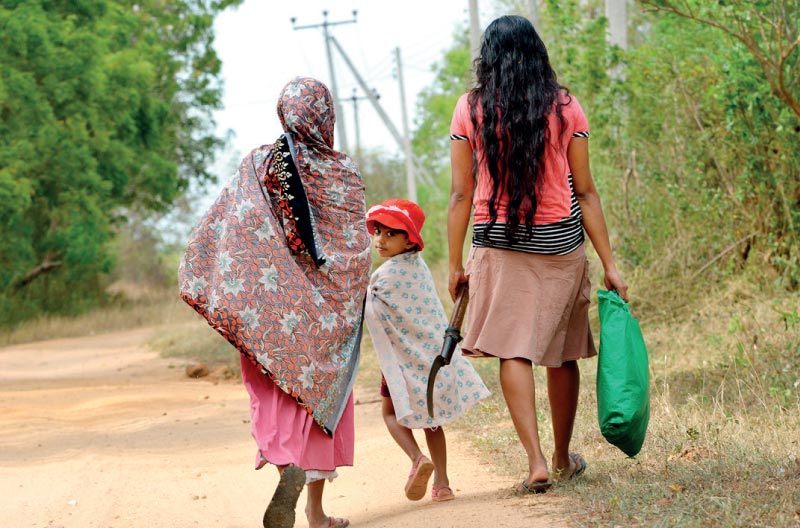Tuesday Feb 24, 2026
Tuesday Feb 24, 2026
Friday, 10 December 2021 00:53 - - {{hitsCtrl.values.hits}}

Sri Lanka ranks 116th out of 156 countries in the Global Gender Gap Index 2021 and a lot needs to be done to address systemic gender inequalities that hinder women’s economic empowerment – Pic by Shehan Gunasekara
 Women and girls, and people of all genders should have equal rights and opportunities, and the right to live a life without violence and discrimination. This is what gender equality is, and it is a human right.
Women and girls, and people of all genders should have equal rights and opportunities, and the right to live a life without violence and discrimination. This is what gender equality is, and it is a human right.
To-date, there is no country in the world that has achieved gender equality. In Sri Lanka and around the world, deep-rooted patriarchal systems and social norms continue to deny women of their economic rights, including the right to paid work, which thereby keeps women from realising their full potential. In fact, in 2019, women’s participation in the paid workforce in Sri Lanka was at 36%, which was among the lowest in the region.
A forthcoming study by UN Women in Sri Lanka notes that from the recruitment stage itself, gender-biased discrimination works against women from participating in the labour force. Additionally, violence against women, including the prevalence of sexual harassment in the workplace and in public transport, keeps women away from the workforce.
As Sri Lanka ranks 116th out of 156 countries in the Global Gender Gap Index 2021 a lot needs to be done to address systemic gender inequalities that hinder women’s economic empowerment.
Gender equality begins at home
Societal expectations of what women and girls can and cannot do, often starts at home. One example is the unequal distribution of unpaid care work and housework. Sri Lanka’s Time Use Survey (2017) found that 87.3% of women and girls over the age of 10 did housework and care work, compared to only 59.7% of men and boys.
When women and girls are expected to engage more in such work over their male counterparts, they are often the first to drop out of school, or from paid work – especially during crisis situations such as the COVID-19 pandemic. Even when women are the primary earners, research shows that 43% do most or all of the household work. This means that women have less time to network, upskill or reskill, or pursue opportunities for career growth, though often limited. In fact, a lack of networking opportunities was reported by ADB as one of the reasons for the lack of female representation at the managerial level.
A girl’s educational attainment directly contributes to women’s economic empowerment. Equal access to education and employment are fundamental human rights. Equally sharing household responsibilities and challenging harmful gender stereotypes at home will go a long way to ensure women and girls have the choice to meaningfully participate in the labour force and in all spheres of life.
Transforming the education system
Schools can also play an important role in promoting gender equality as bringing in a culture of gender equity can erase gender bias from an early age in children. Engaging boys from a younger age and challenging stereotypes that reinforce inequality between genders, and educating them about respect and consent, will have a ripple effect in preventing sexual violence and harassment when they are older.
As societal attitudes often prescribe the kind of jobs women could do, changing mindsets from a younger age to recognise that women are equally capable of pursuing any career can also help erase unconscious bias in boys.
Transforming social and institutional structures
Governments have a responsibility to monitor and enforce, and enact laws to ensure the protection of all workers. Employers have the responsibility to remove all forms of discrimination in corporate policies and practices to align them with international human rights principles that advocate to ensure everyone is treated fairly at work. This includes adopting a range of gender-sensitive practices including equal pay, appointing skilled women to managerial positions, providing flexible working arrangements and adequate maternity and paternity leave for employees.
While adopting such policies will increase organisational effectiveness and growth, it must be noted that companies have a moral and legal obligation to create conditions for decent work and protect employees against discrimination – which are basic human rights.
A human rights-based approach to development
Equality, inclusion and non-discrimination are the best ways to reduce inequalities and States have mandatory obligations to eliminate harmful gender norms under international Human Rights treaties, especially under the Convention on Elimination of All Forms of Discrimination against Women.
Empowering women in the economy and closing gender gaps in the world of work is key to achieving the 2030 agenda. It is only when women, who represent over half of Sri Lanka’s population are included and given equal rights will there be sustainable development.
(Ramaaya Salgado is the Country Focal Point at UN Women in Sri Lanka. She has served in different capacities in various international development agencies and local not-for-profit organisations, including the UNDP Regional Centre in Colombo, Care International, Save the Children, and the Centre for Policy Alternatives. She has over 14 years of experience in international development and has worked extensively on issues pertaining to gender equality and women’s rights with a special focus on governance, peace and security issues.)
(Talal Rafi is a global consultant on innovation, entrepreneurship and gender equality. He is a member of the Expert Network of the World Economic Forum. His work has been published by the World Bank, International Monetary Fund, Asian Development Bank, World Economic Forum, London School of Economics and Forbes.)